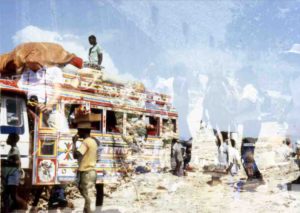Dec 8, 2010 (CIDRAP News) – A report by an epidemiologist sent by France to assist Haiti with the cholera response said United Nations (UN) peacekeeping forces from Nepal are the most likely source of the outbreak, though others deny the claims or say the findings are inconclusive.
The Associated Press (AP) obtained the report yesterday by French epidemiologist Renaud Piarroux, which concluded that cholera originated in a tributary of the Artibonite River near a UN base in Mirebalais that housed the soldiers.
The report does not offer any evidence that the soldiers were infected but said no other hypothesis can be found to explain the outbreak, which occurred in a village that wasn’t affected by the earthquake and is not near the coastal area or refugee camps, the AP reported.
The report came amid initial election results announced yesterday evening in Haiti, which has prompted fresh rounds of protest violence in Port-au-Prince and other areas. According to press accounts of the initial results, the election is headed toward a runoff between the top two vote-getters, Mirlande Manigat, a law professor and former first lady, and Jude Celestin, a government-backed candidate supported by Haiti’s president Rene Preval. The third candidate, who appears to be eliminated, is Michel Martelly, a singer.
Observers in Haiti and abroad, including at the US Embassy, have questioned the validity of the count.
The Piarroux report noted the first cholera cases were reported within days of a new group of soldiers arriving from Kathmandu, which was experiencing a cholera outbreak, but doctors have said none of them reported symptoms and tests on samples from the base turned up no evidence of cholera, according to a Cable News Network (CNN) reported today.
UN spokesman Martin Nesirky said no conclusive evidence suggests the base is the source of the outbreak and said the UN welcomes any scientific debate or investigation on the possibility, the London-based Daily Mail reported today.
Dr Eric Mintz, from the US Centers for Disease Control and Prevention (CDC), told CNN that international research is under way on the origin of Haiti’s outbreak, and that so far, tests show the strain is indistinguishable from strains seen in other South Asian countries and is not unique to Nepal.
The UN’s Office for the Coordination of Human Affairs (OCHA) said in an update yesterday that Haiti’s health ministry has received reports of 93,222 cholera cases, including 44,157 hospitalizations and 2,120 deaths. Cases are increasing in all 10 of Haiti’s departments, and officials are working to confirm that cases have been detected in schools.
The agency said it expected that the release of the presidential election results and a public holiday on Dec 9 will interrupt cholera response activities. Several response efforts are targeted to providing safe water and improving hygiene at schools, OCHA said.
OCHA said some of the biggest gaps are water and sanitation in the North West and Center departments and personnel and supplies for health centers in the remote and mountainous areas in Cap Haitien.
Elsewhere, the Dominican Republic’s public health ministry said yesterday that it has now received reports of 22 cholera cases, with the 2 most recent ones detected in the country’s western Elias Pina province, which borders Haiti, Dominican Today reported yesterday. However, most of the cases are in Santiago and Santo Domingo.

 Staff Writer
Staff Writer
Well, as many people already knew, they would never want it to be true that the cholera is from another country into Haiti.